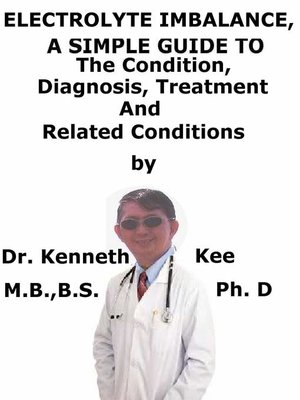Electrolyte Imbalance, a Simple Guide to the Condition, Diagnosis, Treatment and Related Conditions
ebook
By Kenneth Kee

Sign up to save your library
With an OverDrive account, you can save your favorite libraries for at-a-glance information about availability. Find out more about OverDrive accounts.
Find this title in Libby, the library reading app by OverDrive.



Search for a digital library with this title
Title found at these libraries:
| Library Name | Distance |
|---|---|
| Loading... |
This book describes Electrolyte Imbalance, Diagnosis and Treatment and Related Diseases
Electrolyte imbalance in the body can produce fluctuations in the important electrolytes such as sodium and potassium which can affect the heart and kidney functions adversely.
Electrolyte Imbalance Diseases are medical disorders which are involved by the alterations in the balance of sodium and potassium in the blood.
Common diseases are:
1. Hyponatremia or Low Sodium is caused by water intoxication.
2. Hypernatremia or High Sodium is normally linked with dehydration.
3. Hypokalemia or Low Potassium happens when the body loses too much potassium from vomiting, diarrhea, sweating, and medicines like diuretics or laxatives.
4. Hyperkalemia or High Potassium is a life-threatening disorder which produces abnormal electrical conduction in the heart and possibly life-threatening heart rhythm disorders.
Electrolytes are chemicals that are necessary for the cells in the body to function.
Electrolytes such as sodium, potassium, and others are required in permitting cells to:
1. Generate energy,
2. Maintain the stability of their walls,
3. Contract muscles
They are monitored by hormones like
1. Renin from the kidney,
2. Angiotensin from the lung, brain and heart,
3. Aldosterone from the adrenal gland, and
4. Antidiuretic hormone from the pituitary
These hormones monitor the amount of sodium, potassium, and water in the bloodstream and keep the electrolyte balance within a very narrow range of normal limits for the body to function.
Ensuring that the electrolyte concentrations are in good balance, stops the body from dehydration.
Electrolytes are important for basic life function such as maintaining electrical neutrality in the cells, generation, and conduction of action potentials in the nerves and muscles.
Sodium, potassium, and chloride are the important electrolytes together with magnesium, calcium, phosphate, and bicarbonates.
Electrolytes are obtained from the food and fluids.
These electrolytes can develop an imbalance, causing either high or low levels.
A high or a low level of electrolytes interferes with the normal bodily functions and can cause even life-threatening complications.
The measurement of electrolytes will help the doctors in the diagnosis of a medical disorder, the effectiveness of treatment and the possible side effect of medicines.
A patient with heart failure receiving diuretics requires a workup for potassium, bicarbonate, magnesium as diuretics can produce adverse effects on electrolyte balance
A patient that manifests with weakness requires a basic electrolyte workup, as an electrolyte imbalance, particularly in sodium and potassium levels, can cause fatigue
Hypomagnesemia can cause hypocalcemia as it disrupts the action of parathormone.
Administration of intravenous insulin is linked with a spurious reduction in potassium levels as insulin moves potassium intra-cellularly.
Most of the calcium is attached to proteins, out of which albumin-bound calcium comprises 80%.
In a patient with hypoalbuminemia as present in liver cirrhosis, the nephrotic syndrome will have low calcium levels as compared to the actual values.
Treatment
1. Remove causes:
2. Restore low electrolyte levels
3. Assess electrolyte levels during hospital stay
4. Eliminate high electrolyte levels
a. Diuretics to raise electrolyte excretion in the urine.
b. Cation-exchange resins are drugs that attach to electrolyte and cause its elimination via the gastrointestinal...







